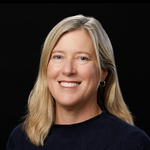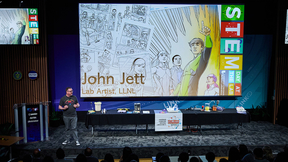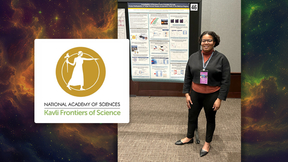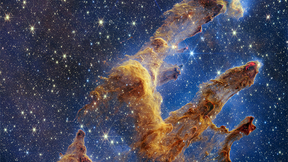A passion for physics drives Danny Attiyah
 (Download Image)
(Download Image)
LLNL intern Danny Attiyah, right, and his mentor Andrew Longman at the Jupiter Laser Facility, where a long experimental run will test simulations Attiyah has developed this summer. Photo: Jason Laurea/LLNL.
This summer, Danny Attiyah, a third-year Ph.D. student at the University of California, Irvine, will develop theory, create simulations and put those simulations to the test in a long experimental run.
“I’m excited to go from theory to experimental results during my internship,” he said.
Attiyah, who grew up in Southern California, was drawn to math as a student. But when he took his first physics class, he was hooked.
“I found physics challenging enough to keep me interested,” he said. “Being able to describe the world using math was so exciting. I thought, ‘I could do this for the rest of my life.’ ”
Just as discovering his passion for physics came naturally, so did his internship with the National Ignition Facility and Photon Science (NIF&PS) directorate at LLNL. Last year, Attiyah attended the American Physical Society’s Division of Plasma Physics conference. His poster on his research on laser-plasma interactions using structured light pulses caught the attention of LLNL physicist Andrew Longman.
“We talked for about two hours,” Attiyah recalled. “Andrew mentioned that I should consider an internship at Lawrence Livermore.”
Attiyah’s passion made an impression on Longman. “It’s great to see so much enthusiasm in a student,” he said. “Danny really enjoys what he’s doing and he’s very curious. His questions are helping me learn, too.”
The synergy that Attiyah found with Longman, who became his mentor this summer, carries over into his intern projects, which coincide well with his thesis project.
At LLNL, Attiyah is working on two projects. The first is to drive magnetic fields at the COMET laser in an upcoming experiment in August using orbital angular momentum beams — a state of twisted light that can drive helical plasma currents. These currents can drive significant magnetic fields well more than 1,000 Tesla, which extend up to 1 millimeter in length and last for 10s of picoseconds. To measure these extreme magnetic fields, Attiyah will utilize the Faraday effect, in which the polarization of a probe beam is rotated as it passes through a magnetized plasma. The experiment will be the first to measure these magnetic fields driven by twisted beams.
The second project is exploring how to generate spatio-temporal light springs, an exotic state of light consisting of multiple frequencies spread over multiple orbital angular momentum modes. These beams have not been previously demonstrated in the laboratory but could be created using a NIF-like beam. Attiyah will develop optical tools and models to generate and detect the beams, as well as theory and simulations to predict how they will interact with plasma.
“It’s the coolest thing,” Attiyah said. “The resulting magnetic fields could potentially be stronger than any other magnetic field created in a laboratory so far.”
In addition to his research project, Attiyah is enjoying the social side of being at intern at LLNL. Most days, he eats lunch with other interns and spends time on the weekends with interns hiking and exploring Livermore. In his free time, which he doesn’t have much of — being a Ph.D. student — he enjoys soccer, basketball or any form of exercise, which he says is his stress relief.
Contact
 Patricia Koning
Patricia Koning
[email protected]
(925) 423-4332
Related Links
National Ignition Facility and Photon ScienceTags
Jupiter Laser FacilityLasers and Optical S&T
Lasers
National Ignition Facility and Photon Science
Featured Articles







